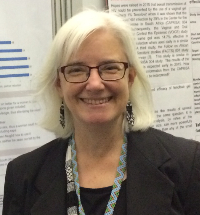
Dr. Kate MacQueen is a longstanding HPTN Ethics Working Group (EWG) representative supporting HPTN 096, HPTN 083-01, HPTN 084-01, and the Women-at-Risk Scientific Working Group. Dr. MacQueen is also a senior social scientist at FHI 360, an adjunct associate professor at the University of North Carolina (UNC) at Chapel Hill in the School of Medicine and the Gillings School of Public Health, and directs the Development Core of the UNC Center for AIDS Research in Chapel Hill, North Carolina. She has conducted extensive research on the social, behavioral, and ethical aspects of biomedical HIV prevention trials globally and domestically, including vaccines, microbicides, vaginal rings, and pre-exposure prophylaxis.
What attracted you to a career in HIV prevention research?
I was a graduate student studying population dynamics and the intersection of race, gender, and social structure in the Caribbean when HIV hit in the 1980s. HIV impacted people I knew and loved. I volunteered as an AIDS community educator while in graduate school. I had the opportunity to support some early United States Agency for International Development (USAID) consulting work that brought together global stakeholders to discuss addressing the pandemic. In 1991 I successfully applied for a National Institutes of Health (NIH)-funded post-doctoral HIV/AIDS Training Program for Behavioral and Social Scientists jointly sponsored through Emory University School of Public Health and the Centers for Disease Control and Prevention (CDC). The program confirmed the critical need for HIV prevention research and that there was a role for someone like me, with my social science training, in that work.
What would you say most motivates you to do what you do?
Right now, what motivates me the most is the potential we have to end the HIV pandemic. Research is still a critical component for achieving that, which means we need to support the next generation of HIV prevention researchers and advocates. We have exceptional leadership with deep experience in the HIV prevention field, including the HPTN, and we need that profound experience. But we also need fresh insights, innovation based on what is happening now and what will be happening in the next two to three decades. I am motivated to do what I can to clear space for our emerging leaders to shine and succeed and help end the HIV pandemic. The HPTN provides so much opportunity in this regard.
What has been one of your proudest moments as a member of the HPTN?
In 2002 Dr. Quarraisha Abdool Karim asked me to lead the effort to develop the first iteration of the HIV Prevention Trials Network Ethical Guidance for Research. The ethical challenges for HIV prevention research were (and are) many. It was no simple task to translate the sometimes contradictory moral guidance documents into practical Guidance for implementing a wide array of trial designs and research contexts. I was fortunate to work with Dr. Jeremy Sugarman, whose bioethics expertise far exceeded my own, and he, therefore, served as a significant mentor at that point in my career. Under Jeremy’s EWG leadership, the Guidance has since undergone two rounds of revision to meet the continually evolving challenges of HIV prevention research. It serves as a valuable resource both within and beyond the HPTN.
Who has been the biggest influence in your career? Why?
I can’t point to just one person. For the years I’ve devoted to working on HIV prevention, there are two people. First, Dr. Harold Jaffee most influenced me when I was a young researcher at the CDC. If his name is not familiar, he was one of the critical CDC epidemiologists investigating the emergence of HIV in the 1980s and is currently Associate Director for Science at the CDC. When I often had to justify my role as a social scientist in the biomedical HIV prevention field, Harold had my back. That meant a lot. Despite being a man of few words (and notoriously cynical!), he was a good mentor in my early years on negotiating the scientific, political, and ego-heavy world of both CDC and the NIH. Dr. Ward Cates was, enthusiastically and undeniably, a huge influence in my career. I first met Ward while we were both at the CDC, and he was one of the reasons I came to FHI 360 in 2001. Though we lost Ward in 2016, his legacy lives on strongly within FHI 360, HPTN, and for sexual and reproductive health and HIV more broadly. His influence on me personally was, and is, deep and wide.
What advice do you have for new HPTN members?
The HPTN is expansive and complex, and it takes time to learn your way around. The work is demanding, and that means people are usually very busy. But don’t be shy about reaching out to someone with a question; don’t take it personally if they are slow to respond. If you joined the HPTN during the COVID-19 shutdown era, you have not had a chance to meet most of your HPTN colleagues in person. When we can meet again, you will be so energized! Collaboration, collegiality, and engagements are the heart and soul of the HPTN. We’ve been good at doing that virtually since long before COVID-19, but wait until you see what it is like in person.
What is your guilty pleasure?
I garden but have eliminated guilt from the equation by designating garden work as an exercise regime. I also write and publish haiku, a concise but nuanced poetry form; here, the guilt is mitigated as haiku can be worked on in little snippets of time

